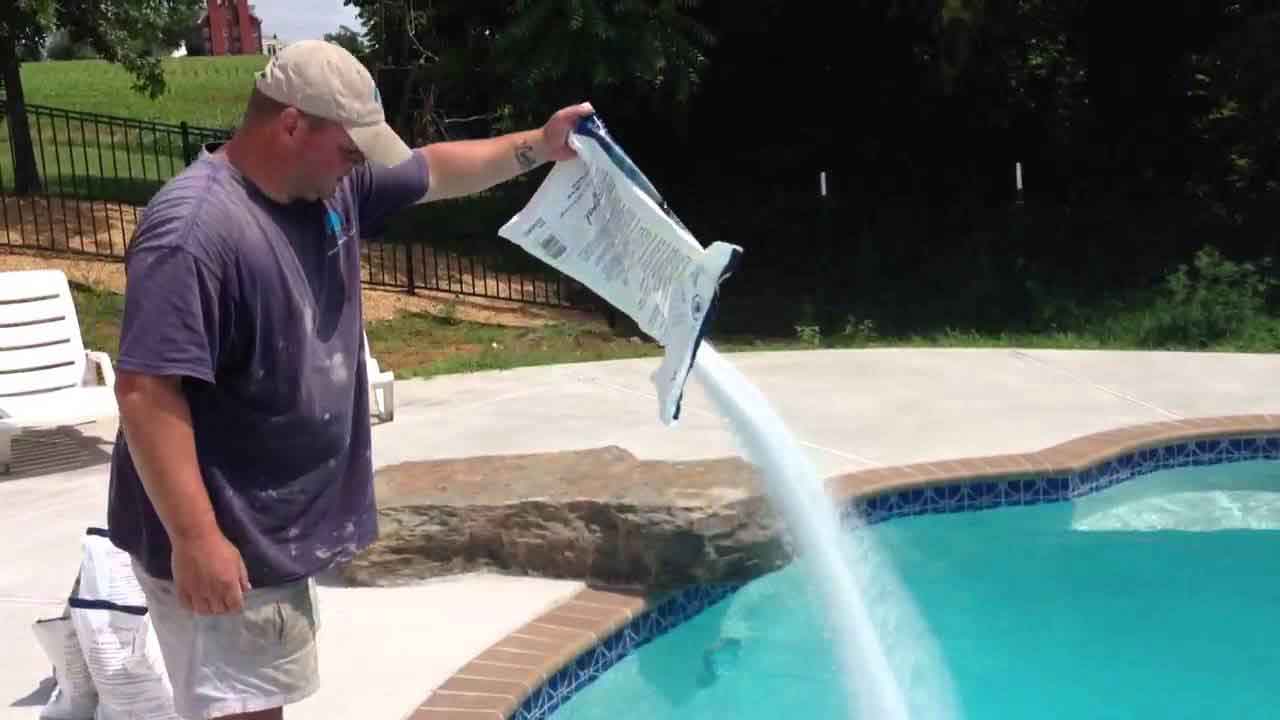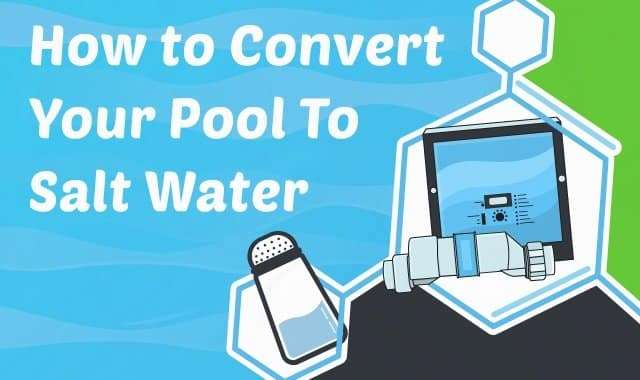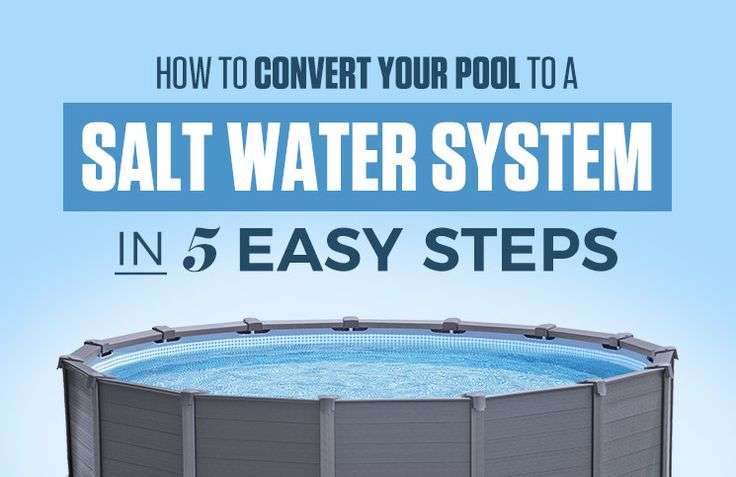Repairs On A Salt Water Pool
Most chlorine pools have a lot of metal components. Salt corrosion is the enemy of metal. Over time, you may notice that your metal components begin to rust. When possible, metal components can be replaced with other materials that are better equipped to handle salt exposure. If you choose to keep your metal components, they may need to be replaced periodically.
Should You Convert Your Inground Pool To Saltwater
The benefits of converting your pool to a salt system are clear, but it might cause you more problems in the end if your pool is incompatible.
It might not be a good idea to switch to a salt system if your inground pool has any metal parts in the structure or if you have metal accessories. You might also choose to steer clear of salt if you have a plaster surface.
However, in most cases, unless your pool has metal walls that can corrode, a saltwater pool can make pool maintenance much easier and give you a better swimming experience overall.
Still thinking about your options when it comes to inground pools, and whether or not you’d like to use a salt system to keep it clean? Take our Pool Type Quiz, which includes a question about saltwater to help you figure out which type of pool best suits your needs:
If you’d like to learn more about salt systems, feel free to check out our guides below. Happy swimming!
Salt Water Pool Conversion In 5 Steps
After you have purchased your salt system it’s time to install it in your existing pool plumbing system. It should be installed at the end of your plumbing after the pump, filter and heater right before the return valve to your pool. This ensures that the freshly chlorinated water that has passed through the salt system and cell enters the pool directly.
The ideal setup is to run your control panel and pool pump from the same power source and timer to ensure simultaneous operation. This keeps the entire system is in sync and ensures that the pump is running during chlorination. You can print off our salt water pool installation diagram for easy reference.
If you decide on a system that requires a more complex installation you will be required to do some basic plumbing and electrical work. It’s recommended that you hire a plumber or pool professional to complete the conversion if you arent comfortable with either of these tasks. If you want to try on your own you can follow our step by step guide on how to complete a salt water pool conversion.
1. Establish Location for Installation
In most inground swimming pools you will be adding the salt system in your existing plumbing that is fitted for 1.5-2.5 inches diameter. It should be installed after the pump, filter and heater and within proximity of the power source and control panel.
2. Plumbing, Flow Switch and Check Valve
3. Sacrificial Zinc Anode
4. Control Panel and Power Supply
5. Adding Salt
Don’t Miss: Venetian Garden Pool
The Cost Of Conversion
Your pool is already built for a chlorine system. All the existing equipment wont be compatible with a salt water pool. New equipment needs to be installed for your salt water pool to work. Many homeowners find that the cost of conversion isnt as much as they had anticipated. In the long run, most homeowners find that its cheaper to maintain their salt water pools. They think of it the same way theyd think of installing solar panels its an investment in the future that will, sooner or later, become less expensive than their previous system.
Reasons To Convert Salt Water Pool Chlorination

- Chlorine pools use caustic chemicals to keep them free of contaminants. Converting to a salt water pool means no risk of spilling corrosive chlorine in your car after you pick up the chemicals from the pool supply store. And no spilling of chlorine onto pool decks, patio furniture or plants as you empty jugs into the pool.
- Avoid exposure to unhealthy chlorine vapors during routine treatments and a no more lingering chlorine smell on your skin, in your hair, pool towels and swim suits.
Don’t Miss: Can You Make Your Own Inground Pool
Enjoy Your Salt Water Pool
Get started today! You can convert your chlorine pool into a saltwater swimming pool and enjoy the benefits of salt water chlorination right in your own backyard. If your pool has a traditional chlorine sanitization system, you can easily switch to Haywards advanced salt chlorination system.
Contact your local Hayward Dealer today to learn how you can create an optimal salt water pool experience.
To learn more about the advantages of salt water pools, read our blog article Advantages of Salt Water Pools.
The Pros And Cons Of Salt Water Pools
Hazardous to handle and store, chlorine can irritate the skin and the eyes. Its no wonder, then, that many people opt for salt water pools, which offer some big advantages over traditional chlorinated swimming pools. Salt water pools do have some downsides you need to consider before purchasing one, however. To decide which type of pool might be right for you, consider the pros and cons of each.
Salt Water Systems vs. Traditional Chlorinated Pools
If you dont know much about salt water filters and pools, the facts may surprise you. For one, they arent anywhere close to being as salty as seawater. In fact, they have only about one-tenth the salinity. Second, they arent completely chlorine-free. Instead, the system uses a process called electrolysis to create chlorine, which disinfects the water.
What are the Pros and Cons of a Salt Water Pool?
Salt Water Pool Advantages
- Because they have lower chlorine levels, salt water pools are much gentler on the eyes and skin.
- Research indicates that salt water systems may be safer than chlorine pools, which force owners to store and handle unsafe chemicals. Likewise, studies suggest that regular exposure to heavily chlorinated swimming pools could pose long-term risks.
- Salt water pools produce softer-feeling water, which many find desirable.
- Because the salt cells in a salt water system only produce chlorine as needed, the pools require far less maintenance when compared to traditional chlorinated swimming pools.
You May Like: Aria Pool Club
How To Convert An Above Ground Pool To Saltwater
For the most part, saltwater pools are still overwhelmingly popular. Still, we come across many pool owners who have questions on how to convert an above ground pool to saltwater. Although the overall concept is the same as inground pools, there are slight differences that are definitely worth mentioning. Additionally, we also cover what a salt pool is, the benefits and drawbacks of having one, and how to size one for your pool.
In short, hopefully, this is a one-stop information shop for your questions about converting your above ground pool to saltwater.
Install The Saltwater System
Installation instructions for each type of saltwater system
The drop-in saltwater system is the best choice for hot tubs because of affordable price, easy maintenance, and easy installation:
Installation is complete and now you can plug it in and turn on the saltwater generator.
Starting a saltwater system
In-line saltwater generators require difficult installation. The cell should be installed in the spa plumbing after the filter and heater. This way, the water will flow through the cell in the correct direction and concentrated chlorine will not pass through any other equipment and will not damage it. We recommend that it be done by professionals per the manufacturers instructions.
Congrats! Now you have a saltwater hot tub. Enjoy fresh and soft water with minimum chemicals.
Read Also: Do Fire Departments Fill Swimming Pools
Installing Saltwater Pool Extras
There are many extras you can purchase to enhance your swimming experience.
- Add a Salt Water Hot Tub Installing a hot tub salt water system costs$500 to $1,700. Any hot tub can be turned into a salt water hot tub, but you can get a molded, hexagonal tub for $3,000 to $10,000. For an inground hot tub, costs can reach around $20,000.
- Handicap Pool Lift A handicap pool lift is available for in-ground pools. One version with a seat that lowers into the water costs $3,355. There are many options for handicap pool lifts, making the pool accessible to nearly every person.
- Patio or deck a concrete pool deck can cost from $3,000 to $10,000, depending on size, design, and complexity.
- Pool Enclosure can cost between $6,000 $8,000
- Pool Fence costs from $600 $4,400
- Water Features
Salt Water Pool Heater
Inground salt water pool heaters cost between $550 to over $10,000, with most pool owners spending from $2,200 to $3,500, and another $400 to $500 for installation. What drives the difference in heater prices for pool heaters is how much water you need to heat, and what the rise in temperature is from the average coldest temperature to the desired water temperature. A heater for an above-ground salt water pool costs from $50 to $200.
- Electric tankless water heaters are suitable for small pools that dont need for the temperature to rise too much, and these generally start between $500 and $600.
- Larger and more powerful electric pool water heaters average between $1,500 and $3,500, while the similar gas-powered pool water heaters fall between $800 and $2,500.
- Electric pump water heaters cost anywhere from $2,500 to$10,000 and these work in hotter climates and transfer the heat in the air to the water in the pool, and they do so very economically.
- A salt water pool heater for your inground pool will cost $50 to $250 per month in electrical costs.
Read Also: Hide Pool Equipment Fence
Installing Your Salt System
So youve made the decision to convert your pool to salt water and now its time to decide whether to hire an expert or DIY it.
If you decide to do it yourself, I say go for it!
You can do it in a weekend and it will save you at least a few hundred bucks, so why not?
Keep in mind that the task does involve some basic pool plumbing and electrical work, cutting and gluing PVC pipes, and using hand tools, though. So, if you are not comfortable with that, theres no shame in calling a pro.
If youre ready to get started on your own, heres what you need to do:
Converting A Salt Pool Back To Traditional Chlorine

This may come as a surprise to some, but not everyone loves salt chlorine generators. Each pool owner has their reasons for not liking salt pools. Some people experience rusting, others have softstone decks, or just dont like plunking down a few hundred dollars for a replacement cell. No matter what the reason is, these pool owners want the easiest way of converting their pool from saltwater to traditional chlorine, a.k.a. freshwater.
In this article, we will discuss the water chemistry and hardware hurdles to overcome when making the switch. But the question asked most often is the following:
Read Also: How Long Should The Pool Pump Run
Setting Up Your Control Box
Depending on the model, the control box usually hangs easily enough on a couple of screws. Then, its power wire will connect to the same power source as the pump .
Usually this means disconnecting all power for safety, tracing the pump’s power cord to where it is plugged in, and connecting the salt system’s cord right there the same way. Be sure to follow all instructions in the manual, follow all local safety codes, and ensure this is done by a qualified person. You can also check this out in more detail in a future update, when we cover How to Install a Saltwater Chlorine Generator!
Choosing Between A Saltwater Pool And Chlorine Pool
Whether you are building a new pool or thinking of converting your pool it is important to know the pros and cons of both saltwater and chlorine pools.
Saltwater pools use a salt chlorine generator for sanitation. As saltwater passes through the generator it separates the salt and water into hydrogen and hypochlorous acid. This acid replaces the need for chlorine tablets to sanitize the water. Saltwater pools are becoming more and more popular as people are informed of the benefits that saltwater pools have.
Don’t Miss: Do Cyanuric Acid Reducers Work
Salt Water Pool Vs Chlorine Pool Cost
The difference in the cost of a salt water pool vs. a chlorine pool lies mainly in the cost of chlorine and the initial purchase of the salt system. Both pools use chlorine to keep algae and other bacteria away, providing a healthy environment for swimming.
A salt water pool creates chlorine with a chlorine generator from the salt added to the water. The cell which is the part that generates the chlorine will need replacing every 3 6 years at the cost of about $800. You will also need salt a few times per year at an average price of $10 per 40-pound bag.
In comparison, a chlorine pool needs to have chlorine added quite often. How often depends on the size of your pool and the results of your weekly water testing. Its typical to go through 1 2 buckets of chlorine tablets a year at the cost of $100 to $755 in addition to other balancing chemicals.
Decide How To Convert To A Saltwater Tub Chlorine Vs Bromine
There are two ways to get a saltwater hot tub chlorine generators and bromine generators. Chlorinators are more popular as they are at least half the price of brominators . There are also saltwater systems that can produce both chlorine or bromine depending on the type of salt you use .
| Chlorinator |
Note: Only bromine generators should be usedin wooden hot tubs because chlorine has a bad effect on wood.
Verdict:
I cant give a simple answer to which is better, bromine or chlorine? This age-old dilemma also applies to saltwater systems. hoose what is more suitable for you based on the characteristics.
Chlorinator is my personal choice for saltwater hot tubs since it has significant advantages: the cost and the availability of the device and the cost of salt.
Tip: If you are still hesitant, buy a salt system in which you can use both salts and try it by yourself you can use theControlOMatic SmarterSpa.
Read Also: Cost Of Inground Pool Buffalo Ny
How Salt Water Pools Are Easier On Your Hair Skin And Eyes
If you have a chlorinated pool, chances are high that your kids have picked up a few pairs of swimming googles over the years. Opening your eyes underwater in a chlorinated pool is painful after all, youre allowing chemicals to come into contact with some of the most sensitive tissue in your body. Salt water is saline, and saline is the main ingredient in eyedrops and contact solution. Salt water pools are a lot gentler on your eyes, skin, and hair because theyre naturally biocompatible.
Be A Pool Owner Worth Your Salt
While a salt water pool will save you money on chlorine, remember that your pool will still need upkeep to maintain clean, crystal clear water. But if youre concerned about the pitfalls of chlorineand youre tired of green hairsalt water conversion may be the perfect solution for you.
Happy Swimming!
Recommended Reading: Aria Dog Friendly
Buy Everything You Need For Conversion To A Saltwater Hot Tub
I made a list of what you need to buy before starting. You should check it as you may already have some of the things and will save on spending.
- Saltwater system
- Needed to refill your hot tub with fresh water Garden Hose End Pre Filter
- GFCI electrical outlet withcover install if not already available near the spa
How Salty Is A Salt Water Pool

Pool salt is a purified crystallized form of common sodium chloride.
The concentration of salt is 3000 to 7000 mg/l for a saltwater pool which is only about 10 to 15% of the salt found in seawater .
The concentration of salt in a pool is about equal to the salinity of the tears in your eyes so opening your eyes underwater will be perfectly comfortable.
You May Like: Is Aria Hotel Pet Friendly
S To Converting Your Pool To A Saltwater Pool
If you currently have chlorine, you may want to know how you would go about transitioning the pool from a chlorine to a saltwater system. Here are the basic steps:
1. Choose your saltwater system.
There are essentially two considerations when you think about which saltwater pool system makes sense for you:
2. Decide if you will drain the pool.
You currently have water in your pool. You want to think about what to do with that water before you set up the chlorinator.
Should you drain your pool? It is actually unnecessary unless you are currently using polyhexamethylene biguanide in which case it is optional.
Polyhexamethylene biguanide is the active ingredient in an antibacterial pool sanitizer that is incompatible with chlorine. Your chemicals could be thrown out of balance in which case your chlorine may not be able to maintain cleanliness if you leave this chemical in the water.
3. Embrace balance.
Salt is central to saltwater pool conversion, but you want to know other levels too. Typically chemical testing looks at calcium hardness, free chlorine, pH, and alkalinity. Healthy ranges for your pool water are as follows:
